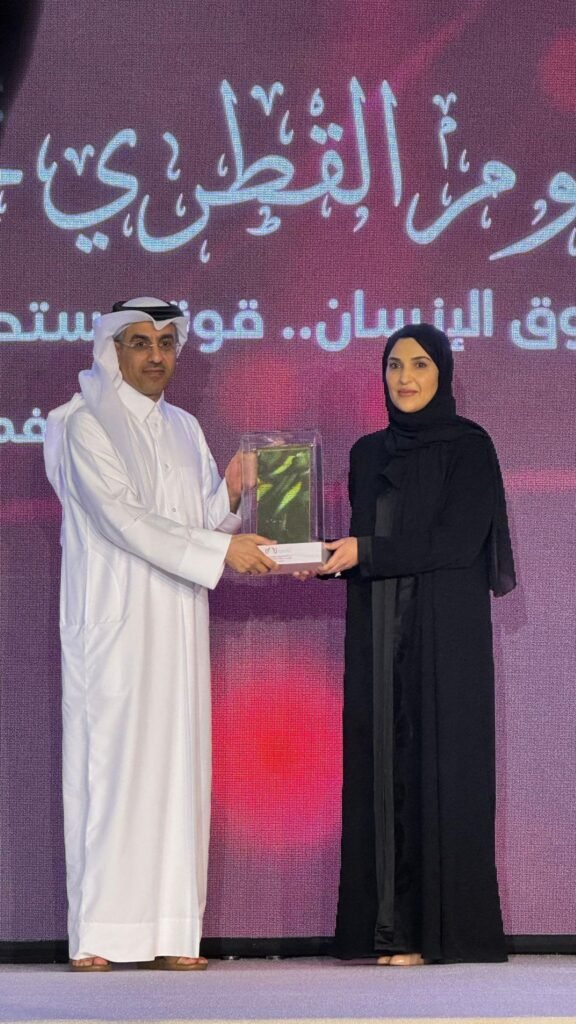PDoha, 11 Nov. 2024
National Human Rights Committee of Qatar (NHRC) launched it's third Human Rights Strategic Plan 2024-30, coinciding with Qatar National Human Rights Day, celebrated under the theme ' Human Rights - A Sustainable Force Towards A Better Future'.
The third plan represents a comprehensive approach to advancing human rights within Qatar, combining sustainable practices and meaningful outcomes.
Present on the occasion were HE Dr Khalid bin Mohamed AlAttiyah, Deputy Prime Minister and Minister of State for Defence Affairs, and founder president of NHRC (2003-2009); HE Dr. Ali bin Saeed bin Samikh Al Marri, Minister of Labour, and second president of NHRC (2009- ); HE Maryam bint Abdullah Al Attiyah, Chairperson, National Human Rights Committee of Qatar; dignitaries; ambassadors; experts in human rights; and officials.
Chairperson NHRC, Maryam Abdullah AlAttiya in her address highlighted the importance of Qatar Human Rights Day, which reflects the nation’s dedication to upholding human rights as a central, strategic priority and a key pillar of effective governance and the rule of law.
She said that this day, observed each year on November 11 to coincide with the founding of the National Human Rights Committee, underscores the State's appreciation for the Committee’s role in promoting and safeguarding human rights at the national level, while enhancing Qatar’s standing in international and regional human rights forums.
She added that this year’s Qatar Human Rights Day celebration holds special significance as it aligns with a major national democratic event: the general referendum on constitutional amendments, which received the overwhelming support of Qatari citizens. This support reflects a shared belief in the amendments’ potential to enhance equal citizenship, strengthen national unity and social cohesion, and foster comprehensive development.
NHRC Chairperson stressed that through its achievements and best practices, as well as its commitment to independence, transparency, and pluralism, the National Human Rights Committee has become a beacon and model for other national human rights institutions across the Gulf, the Arab world, and globally.
She said that this standing has earned the Committee an 'A' accreditation from the Global Alliance of National Human Rights Institutions for three consecutive sessions, spanning from 2010 to 2025. Such recognition would not have been possible without the Committee’s adherence to modern management principles and strategic planning, which emphasize future foresight and proactive preparation.
Highlighting NHRC achievements, Al Attiya said that the Committee’s journey of strategic planning began with its first plan (2011-2014) and continued through its second (2018-2022). Now, with the third strategic plan for 2024-2030, the Committee is setting ambitious objectives for positive, results-oriented performance. This comprehensive strategy includes a range of programs, projects, and initiatives—legal, advisory, cultural, social, and supervisory—that prioritize the rights of vulnerable groups, enhance civil society partnerships, and strengthen institutional and individual capacities. With clear performance indicators, the plan positions the Committee as a driving force in promoting development, monitoring and evaluation, and supporting national human rights efforts in line with local, regional, and international advancements.
She briefed on the benefits and opportunities from the third strategic plan such as :
An enhanced framework for mobilizing, coordinating, and strengthening roles within the Committee to support its programs and achieve its goals.
A clearer structure for the Committee’s interactions with key stakeholders, including civil society organizations, government agencies, and international human rights bodies (both UN and non-governmental), benefiting from the Committee’s transparent vision and philosophy.
In her closing remarks, NHRC Qatar Chairperson expressed her great confidence in country's wise leadership’s continued support for the Committee, as demonstrated by their responses to its recommendations and calls for further initiatives to advance human rights.
She appreciated the collaboration with partners, both inside and outside the country, in bringing this strategic plan to fruition. Al Attiyah paid her gratitude to the members of the National Human Rights Committee, whose dedication will drive the success of this plan through their results-focused approach, she added.
Qatar's 2024-2030 Human Rights Strategic Plan
This plan underscores Qatar’s commitment to improving human rights both domestically and in alignment with international standards. It calls for a collaborative national effort to build a state characterized by strong institutions, good governance, and adherence to the rule of law, while enhancing Qatar’s position as a leader in regional and global human rights forums.
Vision and Mission
The plan’s vision emphasizes a collective determination to ensure Qatar’s national human rights performance aligns with global standards. The mission focuses on contributing effectively to the improvement, protection, and promotion of human rights by empowering and engaging individuals and communities. Through partnerships, the plan seeks to uphold fundamental human values, strengthen institutional frameworks, and reinforce the rule of law. These elements are intended to foster a societal shift where human rights become embedded as an essential part of Qatar’s national identity.
Core Principles
To ensure the plan’s success, a set of guiding principles shapes its framework. These principles include realism, effectiveness, inclusiveness, and a commitment to transparency. The plan emphasizes community partnerships, seeking active engagement from civil society and institutions. These principles are not only aligned with Qatar’s broader policies but are also sensitive to cultural diversity, striving for a balanced approach that respects privacy while promoting inclusivity. Through these foundational values, the plan aims to cultivate an environment of accountability and trust.
Strategic Objectives
The plan outlines specific strategic objectives designed to address a range of human rights priorities:
Legislative Alignment: The strategy seeks to develop a legislative framework that aligns with international human rights standards. This includes proposing draft laws that address pressing issues such as discrimination, domestic violence, and emerging concerns related to artificial intelligence.
Human Rights Protections: The plan prioritizes strengthening mechanisms for human rights protections within the framework of the National Human Rights Committee (NHRC). This includes refining NHRC’s advisory role and ensuring it can effectively advocate for and protect human rights.
Promotion of a Human Rights Culture: Another key objective is to spread awareness and foster a culture of respect for human rights. This will involve initiatives aimed at educating the public and engaging communities, making human rights knowledge accessible and relevant to all.
Building Partnerships: By consolidating regional and international partnerships, Qatar aims to build a network of support for human rights. This objective includes collaboration with civil society and national institutions to reinforce Qatar’s commitment to international human rights standards.
Supporting Civil Society: Strengthening the capacities of civil society institutions is crucial for sustaining a robust human rights framework. The plan commits to providing resources and support for these organizations, empowering them to advocate for and protect human rights effectively.
Enhancing Institutional and Individual Performance: Finally, the plan includes a focus on improving performance at both institutional and individual levels within the NHRC. This objective is aimed at optimizing the NHRC’s impact by fostering high standards and effective goal-setting.
Main Areas of Focus
The plan includes two major areas of focus, or axes, for its implementation:
Legal Axis: This area includes initiatives to establish a legislative framework consistent with international human rights standards. Proposed laws target the prevention of discrimination, domestic violence, and ethical considerations surrounding artificial intelligence. A guide will also be developed to support national bodies in engaging with human rights treaty obligations and the universal periodic review process.
Human Rights Protection Axis: This area centers on enhancing the NHRC’s capacity to protect human rights. By bolstering the NHRC’s operational mechanisms, this axis aims to ensure Qatar’s human rights efforts are comprehensive, transparent, and responsive to new challenges.
Impact and Opportunities
The 2024-2030 Strategic Plan offers multiple benefits and opportunities. It encourages coordination among key stakeholders, making the NHRC’s programs more effective in achieving their goals. The plan also provides a platform for clear communication and collaboration with civil society organizations, government bodies, and international human rights organizations like the United Nations. By fostering a unified approach, the plan reinforces the NHRC’s vision and supports Qatar’s influence within regional and global human rights dialogues.
Conclusion
In summary, Qatar’s 2024-2030 Human Rights Strategic Plan offers a forward-looking framework to establish human rights as a central societal value. Through inclusive practices, institutional transparency, and international collaboration, the plan positions Qatar as a proactive and committed participant in the global human rights landscape.
Maryam Abdullah Al Attiya, Chairperson NHRC Qatar on the occasion presented memente to Deputy Prime Minister and Minister of State for Defence Affairs, Dr. Khalid bin Mohamed Al Attiya and Dr. Ali Samikh AlAttiya, Minister of Labour.



























